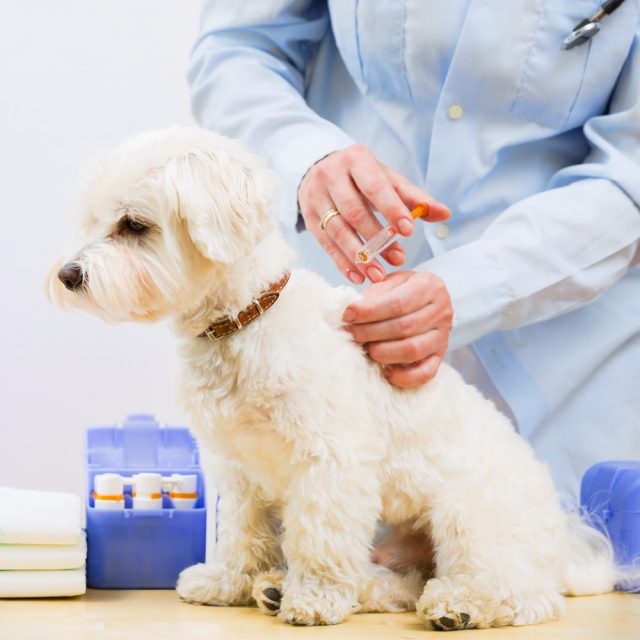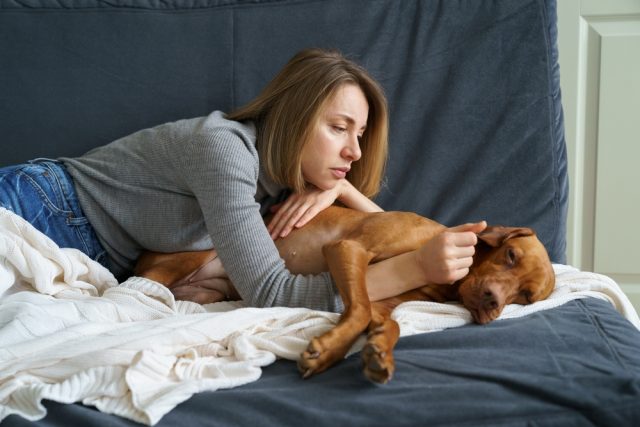Vaccinations have saved countless lives – both human and animal. But as with all pharmaceutical products, they have their side effects. It’s important to understand the difference between normal post-vaccine symptoms and potentially life threatening reactions.
“True” vaccine reactions are rare and the benefits of protecting against deadly diseases like Parvo and Rabies far outweigh the risks.
Understanding the different health concerns associated with vaccines can help you initiate an important discussion with your veterinarian on your dog’s behalf. Together you can determine the best plan for your individual pup at all stages of his or her life.
Systemic Vaccine Reactions
The most common type of vaccine-related illness is known as a systemic reaction. Low-grade fever, depression, loss of appetite, lethargy and weakness are considered normal immune responses to a vaccine as long as the symptoms resolve within 48 hours and do not worsen.
Local Vaccine Reactions
Other pets experience local reactions at the site of the injection. This may involve pain, swelling, abscesses, redness and irritation. Dogs may itch at the injection site or cry out when touched there. Most local reactions resolve on their own without treatment, but it’s important to monitor the site daily and contact your vet if it worsens or does not resolve.
Vaccine-Associated Sarcomas
Vaccine-related cancers are rare in all pets and occur more often in cats than dogs. They manifest as cancerous masses at the injection site. Most often associated with the Rabies vaccine, these sarcomas are considered aggressive, rapidly growing, and malignant. Again, they are very rare in dogs!
Anaphylactic Vaccine Reactions
These are true, life-threatening vaccine reactions and should always be treated as an emergency since there is no way to tell how far they will progress without treatment. Symptoms of anaphylaxis include facial swelling, difficulty breathing, excessive vomiting, diarrhea, severe itching or hives. Without treatment, severe anaphylaxis can lead to shock and death.
Unfortunately there is no way to know which dogs will have serious reactions to vaccines until it happens. Luckily they tend to happen quickly – within hours of the vaccine – and can usually be brought under control with steroids and antihistamines.
Once a dog has had an anaphylactic reaction it is important to take additional precautions in the future like splitting vaccines and pre-treating your pup with antihistamines. If the reaction is severe enough, your vet may recommend discontinuing the offending vaccine(s).
Immune-Mediated Hemolytic Anemia
Another life-threatening condition that has been tied to vaccines is immune mediated hemolytic anemia (IMHA). In some dogs a single vaccine or the cumulative effect of several vaccines triggers the immune system to attack its own healthy red blood cells.
Symptoms include weakness, lethargy, paleness, loss of appetite, exercise intolerance, difficulty breathing, increased heart rate, vomiting and diarrhea. Without treatment, anemia can become so severe that it leads to seizures and death. IMHA usually requires lifelong therapy with fluids, steroids and blood transfusions, but even then there are no guarantees.
Vaccine Titers
Pet owners concerned about these risks can opt to test for viral antibodies in the blood rather than continuing to booster after a certain age. Vaccine titers are several times more expensive than re-vaccinating, but can spare your dog from being unnecessarily exposed to more shots. The levels show whether or not your dog has sufficient antibodies in the blood to protect against disease.
Despite the risks, vaccinating your dog against infectious diseases is an essential part of ensuring their health and well-being. Every healthy dog should at least go through the basic puppy series before limiting or discontinuing boosters.
Aside from the risk of contracting a deadly disease, traveling, boarding, grooming, etc., all become more difficult without current vaccinations, so be sure to make an informed decision on behalf of your dog.



 Toledo, United States.
Toledo, United States.